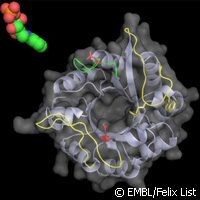Tiny turncoat to topple tuberculosis?
EU-funded researchers at the European Molecular Biology Laboratory (EMBL) in Hamburg, Germany have shed new light on the workings of enzymes from a particular group of bacteria which includes Mycobacterium tuberculosis (Mtb), the bacterium responsible for tuberculosis (TB). Published in the journal Proceedings of the National Academy of Sciences (PNAS), these findings may hold the key to new targeted therapies. For the purposes of this study, the EMBL team, led by Dr Matthias Wilmanns, focused on the bacterium's intriguing ability to produce histidine and tryptophan, two essential amino acids, with the help of a single enzyme. This knack sets it aside from most other organisms, which need two different enzymes to do the job. Instead of the enzymes HisA and TrpF, Mtb uses just one enzyme to catalyse both reactions. This multi-tasking enzyme, known as PriA, can recognise and bind to two different molecules, or substrates. How does it do that? 'When we solved the three-dimensional structure of PriA,' says Dr Wilmanns, 'we found that it has the unique ability to form two different substrate-specific active sites. It can form a reaction-specific active site, or undergo what we call "substrate-induced metamorphosis" to form a different active site.' As a next step, the team screened 20,000 molecule compounds and identified several that inhibit both PriA-catalysed reactions without affecting TrpF. The research was partially funded by the SYSTEMTB ('Systems biology of Mycobacterium tuberculosis') project, which has clinched more than EUR 10.5 million under the Health Theme of the EU's Seventh Framework Programme (FP7) to create a framework for understanding key features of Mtb and its interactions with the host. The SYSTEMTB consortium consists of research and industry experts from the Czech Republic, France, Italy, Germany, the Netherlands, Poland, Spain, Switzerland and the UK. The SYSTEMTB partners' combined efforts are expected to deliver new information and to shape new and cost-effective strategies - advances that would represent a valuable contribution to the world's efforts to tackle TB. According to World Health Organization (WHO) estimates, one third of the global population is infected with the bacillus. An alarming thought, say experts, even if no more than 1 infected person in 10 is likely to develop the disease - and in fact, as TB thrives on a weakened immune system, the risk is higher for individuals with HIV/AIDS. Global action to control the disease has produced remarkable results, but nonetheless it is estimated that TB has claimed 1.7 million lives worldwide in 2009. The world's struggle to turn the tables on TB is complicated by the fact that the disease itself is fighting back. New, increasingly drug-resistant strains have emerged, and innovative treatments and treatment strategies are needed to keep them in check. They will, in all likelihood, be based on leads such as those proffered by Dr Wilmanns and his team. 'We believe that this ability for bi-substrate catalysis in Mycobacterium tuberculosis could be a new opportunity for future drug development,' he says. 'This organism-specific reaction process could be exploited, since only the pathogen but none of the other bacteria living in or on humans, many of which are important for our wellbeing, would be targeted.' The Leibniz Institute for Molecular Pharmacology in Berlin, Germany contributed to this study.For more information, please visit: European Molecular Biology Laboratory (EMBL): http://www.embl.de(opens in new window) SystemTB project factsheet on CORDIS, click: here WHO factsheet on tuberculosis, click: here(opens in new window) PNAS: http://www.pnas.org/content/early/2011/02/09/1015996108.abstract(opens in new window)
Countries
Germany



